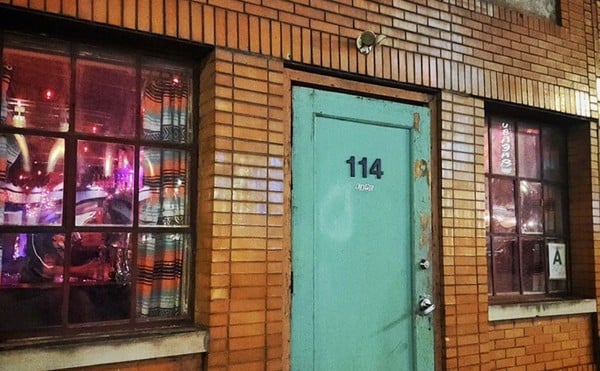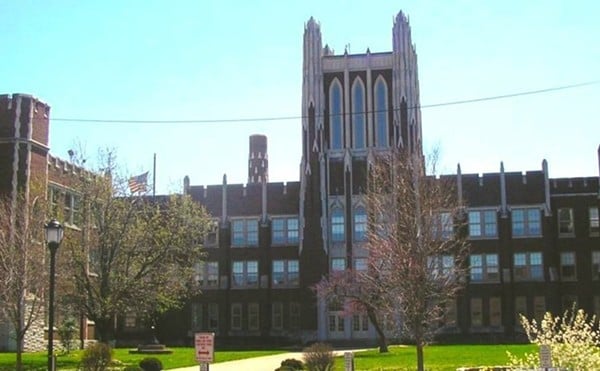As difficult as it was to fathom how the Omni Hotel & Residences project planned for downtown could go more dreadfully awry, last week it became radioactive after a bizarre, nuclear public relations meltdown led by Chris Poynter, Mayor Compassion’s abrasive director of communications. On Monday, the mayor’s office notified the news media an hour before a meeting “to unveil the design enhancements to the Omni project” that “no cameras (still or video) are allowed.” When WAVE-TV News Director Bill Shory protested, Poynter responded, “Then don’t come,” according to Shory’s formal complaint to Mayor Greg Fischer.
When Shory “raised the same objection in person at the meeting,” Poynter doubled down, saying, “Anyone who doesn’t want to adhere to that can leave.” The next day, Poynter backpedaled. “We should have allowed cameras to record the media briefing,” he stated in an email wave3.com published, but the restriction remains unexplained.
At best, the camera ban was a failed attempt to divert attention from an orgy that only gets uglier. Despite high hopes for meaningful changes, the predominantly cosmetic enhancements fell flat. Preservation Louisville conveyed widespread disappointment that the old Water Company Headquarters was not integrated into the redesign. Louisville Forward’s Mary Ellen Wiederwohl, a former lobbyist in Frankfort, dismissed that option as “a carnival version of preservation and something that is just preserved and then a building around it that has no context to the original history and preservation of that old building.”
Nice try, but architecturally significant structures are successfully integrated into new buildings routinely — when it’s not an afterthought — which begs the question of why the integration of at least the façade wasn’t a priority at the outset.
Welcome to the Bonobo Republic of Louisville, where municipal and mega-business moguls fornicate first and get acquainted later. By all appearances, Mayor Fischer gave Omni carte blanche to do whatever they wanted despite a public investment of $139 million, nearly half of the project’s price tag.
WHAS-TV quoted Wiederwohl recalling Mayor Possibility’s “clear statement” in May that the building “could not stay where it was” but “could not be demolished. So now we are working on options in the middle” — notably relocation, which could cost taxpayers as much as $1 million. What kind of context does that render?
The mayor’s office was in a defensive crouch even before Poynter’s PR carnival. A month ago, the C-J published an editorial by developer Gill Holland, one of the mayor’s core supporters, who commands enormous respect. Titled, “Listen to community on Omni issues,” Holland admonished that “the groundswell of citizen dismay is growing” and called the Omnibus failure “a serious disappointment in democracy.”
“Contractual promises NOT to incentivite any other significant (more than 400 rooms) hotel group within a mile of downtown for almost 10 years is of utmost concern,” he wrote, disparaging them as a drop-dead impediment to an additional major hotel a growing downtown would need within the next decade.
This extraordinary, anti-competitive favoritism is reminiscent of the previous administration’s sweetheart deals with The Cordish Companies, which stigmatize Fourth Street Live! (beset by high turnover) to this day.
“This deal was done without adequate community input,” Holland wrote.
There’s another Fischer loyalist whose disappointment is palpable. Philanthropist Christy Brown has been working with designer Brent Bucknam of the Oakland-based Hyphae Design Laboratory to promote ideas that might spare the Omni of the Cordish curse. In his article “Here’s what the Omni Hotel could look like if community input were part of the development process” at brokensidewalk.com, Branden Klayko reports Bucknam saying, “If the city had collaborated from the beginning, they wouldn’t be stressing about changes putting the project behind schedule. They should have worked with the community from the outset.”
The ordeal harkens back disappointingly to four years ago, when Fischer sacrificed the historic Elmo building amid a backdoor deal with developer Todd Blue (see “An (open)ness letter, LEO Weekly, August 10, 2011).
The current plan appears to be on a fast track to final approval, but Fischer and Omni executives would be wise to be careful what they wish for. Heed the advice of WHAS-TV journalist Doug Proffitt, who delivered on July 23 “Omni's Louisville problem,” his first commentary in a distinguished 30-year tenure.







